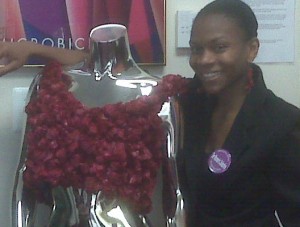LISTEN TO ABBY CHARLES:
Audio clip: Adobe Flash Player (version 9 or above) is required to play this audio clip. Download the latest version here. You also need to have JavaScript enabled in your browser.
“You could tell a woman, ‘Here’s a condom. This is how you protect yourself.’ She could know all the facts about how to protect herself. But if she’s going home to a situation where there is violence, which is happening [at] high levels in our community, how can she use that condom? How can she demand that [he put it on]? Especially when she’s dependent on that partner for… her housing, for her income.”
March 10 was National Women and Girls HIV/AIDS Awareness Day. Sitting in the lounge of the Women’s Collective, where she serves as Policy and Advocacy Coordinator, Abby Charles continued, “That’s a big piece [of] why women are at risk. It’s not just [that] we don’t have the knowledge, it’s also that we’re living in a structural environment that places women at risk.”
“Having the tools is great. Having access to testing, having access to condoms, those are pluses in the right direction. But we also need to start addressing those other structural issues, otherwise we’re not going to end this epidemic.”
According to the Centers for Disease Control (CDC), an HIV/AIDS rate of more than 1 percent is considered a “generalized and severe” epidemic. In the District of Columbia, the HIV/AIDS rate stands at more than 3 percent overall, and significantly higher among African Americans.
For National Women and Girls HIV/AIDS Awareness Day, the Washington Area Women’s Foundation released a statement which said, “The District of Columbia has the highest AIDS case rate for women in the country… [I]t is 12 times the national average and rivals sub-Saharan African countries.”
The Women’s Collective is based in D.C. and works with “women, girls and their families living with or at-risk for HIV/AIDS.” Charles said, “What we see with the economic downfall and downturn [is] that women… want to work, but it’s difficult because there are no jobs.”
“Sometimes they turn to whatever they can to bring in an income for their families. So income supports are extremely important in this discussion around women and HIV. We need to start looking more at models around microenterprise.
“How do we build skills in women to have their own businesses, to generate their own incomes in ways that are safer for them so that they are not dependent on others for their lives? Then they can empower themselves to protect themselves even more.”
Related Links: www.womenscollective.org

